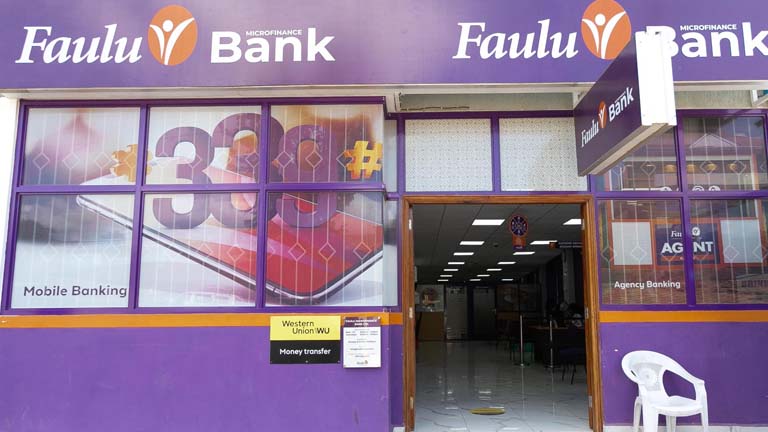Business
Man’s Painful Ordeal Reveals Faulu Bank’s Rough Hands As He Gets Auctioned Over A Friend’s Loan
What began as a modest guarantee of Sh5.6 million against an Sh11 million loan has morphed into a cautionary tale of institutional greed, legal manipulation, and the ruthless machinery of debt collection that grinds ordinary Kenyans into dust.

Kennedy Kimutai Salat’s act of friendship has cost him everything. In a shocking display of predatory lending practices, Faulu Microfinance Bank has auctioned off his Sh32.5 million property for a pittance, turning a simple guarantee into a financial nightmare that exposes the dark underbelly of Kenya’s microfinance sector.
When Kennedy Kimutai Salat extended a helping hand to his friend Robert Kanuli in November 2015, he had no idea he was signing away his future.
What began as a modest guarantee of Sh5.6 million against an Sh11 million loan has morphed into a cautionary tale of institutional greed, legal manipulation, and the ruthless machinery of debt collection that grinds ordinary Kenyans into dust.
The facts are as damning as they are disturbing. Kimutai, a property owner in Kericho, agreed to guarantee half of the Sh11 million loan that his friend Kanuli, director of Kanuli Information Technology Solutions Limited, sought from Faulu Microfinance Bank to expand his business.
He offered his prime property title deed as security, confident that his liability was capped at the guaranteed amount.
Fast forward to July 2024, and Kimutai’s world came crashing down.
Out of nowhere, he received a redemption notice from Antique Auctioneers informing him that Faulu Bank intended to auction his property to recover a staggering Sh32.9 million that Kanuli had defaulted on.
The original Sh11 million loan had mysteriously ballooned to triple its size, and somehow, Kimutai’s limited guarantee had been transformed into blanket security for the entire debt.
But Faulu Bank wasn’t interested in explanations or legal niceties. Before Kimutai could even comprehend what was happening, the bank moved with clinical efficiency.
By February 2025, his property was sold at public auction to Emmanuel Kibet Kirui for Sh13 million—less than half its actual value of Sh32.5 million.
When Kimutai rushed to the lands office to conduct a search, the property had already been transferred to the new owner.
The mathematics of this transaction reveal the true character of Faulu Bank’s operations.
A property worth Sh32.5 million sold for Sh13 million to recover a debt that Kimutai was never fully liable for in the first place.
Even if the bank had a legitimate claim to auction the property, the grotesque undervaluation smacks of either criminal negligence or deliberate fraud. Where did the difference go? Who benefits from such a fire sale?
This is not just about one man’s misfortune.
This case pulls back the curtain on the predatory practices that have become standard operating procedure for many microfinance institutions masquerading as champions of the common man.
Faulu Bank, which markets itself as a financial partner for ordinary Kenyans, has shown its true face—that of an institution willing to destroy lives and livelihoods to recover debts by any means necessary.
The legal questions are glaring.
How does a limited guarantee of Sh5.6 million suddenly become security for Sh32.9 million? How does an Sh11 million loan explode to nearly three times its original size in less than a decade? What kind of interest rates and penalty charges did Faulu Bank apply to achieve such exponential growth? And most damningly, what justification exists for selling a Sh32.5 million property for Sh13 million?
Through GKL Advocates, Kimutai has now moved to the Milimani Law Courts, filing a case on September 20 that seeks to expose these illegal actions and reclaim his property.
He argues that Faulu Bank breached the charge agreement by demanding repayment of the entire debt despite his liability being limited to Sh5.6 million.
He wants the sale declared illegal, null and void, and seeks to be discharged from any liability beyond the guaranteed amount.
Justice Linet Omollo has ordered the parties served and given them 14 days to file responses, with the matter set for hearing on November 11. But the damage has already been done.
Kimutai has lost property worth Sh32.5 million while his actual liability was Sh5.6 million—a loss of Sh26.9 million that can only be described as institutional theft dressed in legal paperwork.
This case raises uncomfortable questions about the regulatory oversight of microfinance institutions in Kenya.
Where was the Central Bank of Kenya when Faulu Bank was transforming limited guarantees into unlimited liability? Where were the auctioneers’ ethical obligations when they sold a property for 40 percent of its value? Where were the safeguards meant to protect Kenyans from exactly this kind of financial predation?
The collaboration between Faulu Bank and Kimutai’s former friend Kanuli also deserves scrutiny.
How did Kanuli’s business fail so spectacularly that an Sh11 million loan became Sh32.9 million in debt? Was there any effort to restructure the loan, to negotiate payment terms, or to explore alternatives before destroying a guarantor’s life? Or was the property always the target, with Kimutai’s friendship merely the vehicle to access it?
What makes this case particularly egregious is the speed and efficiency with which the bank operated once it decided to auction the property.
From notice to sale to transfer took mere months—a stark contrast to the years it typically takes ordinary citizens to get justice in Kenyan courts.
When banks want their money, the machinery of state moves with remarkable alacrity.
When citizens seek protection from institutional overreach, they are told to wait.
Kimutai’s ordeal is a mirror held up to Kenya’s financial sector, and the reflection is ugly.
Behind the glossy advertisements and promises of financial inclusion lies a brutal reality: microfinance institutions that trap borrowers and guarantors in debt cycles, charge usurious interest rates, and deploy auction houses as weapons of mass financial destruction.
The message from Faulu Bank is clear and chilling: friendship has a price, and that price is everything you own.
Think twice before you guarantee anyone’s loan, because the fine print that limits your liability is worth less than the paper it’s written on when the bank decides it wants your property.
As Kimutai awaits his day in court, his case stands as a warning to every Kenyan who has ever considered helping a friend in need.
In a country where banks operate with impunity and the law is weaponized against the vulnerable, acts of kindness can cost you everything you’ve worked for.
Faulu Bank has shown us who they really are. The question now is whether our courts and regulators have the courage to hold them accountable.
Kenya Insights allows guest blogging, if you want to be published on Kenya’s most authoritative and accurate blog, have an expose, news TIPS, story angles, human interest stories, drop us an email on [email protected] or via Telegram
-

 Grapevine2 weeks ago
Grapevine2 weeks agoAlleged Male Lover Claims His Life Is in Danger, Leaks Screenshots and Private Videos Linking SportPesa CEO Ronald Karauri
-

 Grapevine1 week ago
Grapevine1 week agoRussian Man’s Secret Sex Recordings Ignite Fury as Questions Mount Over Consent and Easy Pick-Ups in Nairobi
-

 Investigations5 days ago
Investigations5 days agoMulti-Million Dollar Fraud: Three Kenyans Face US Extradition in Massive Cybercrime Conspiracy
-

 Economy4 days ago
Economy4 days agoIran Demands Arrest, Prosecution Of Kenya’s Cup of Joe Director Director Over Sh2.6 Billion Tea Fraud
-

 News3 days ago
News3 days agoTHE FIRM IN THE DOCK: How Kaplan and Stratton Became the Most Scrutinised Law Firm in Kenya
-

 Business5 days ago
Business5 days agoA Farm in Kenya’s Rift Valley Ignites a National Reckoning With Israeli Investment
-

 Business2 weeks ago
Business2 weeks agoM-Gas Pursues Carbon Credit Billions as Koko Networks Wreckage Exposes Market’s Dark Underbelly
-

 Africa1 week ago
Africa1 week agoFBI Investigates Congresswoman Ilhan Omar’s Husband’s Sh3.8 Billion Businesses in Kenya, Somalia and Dubai



















